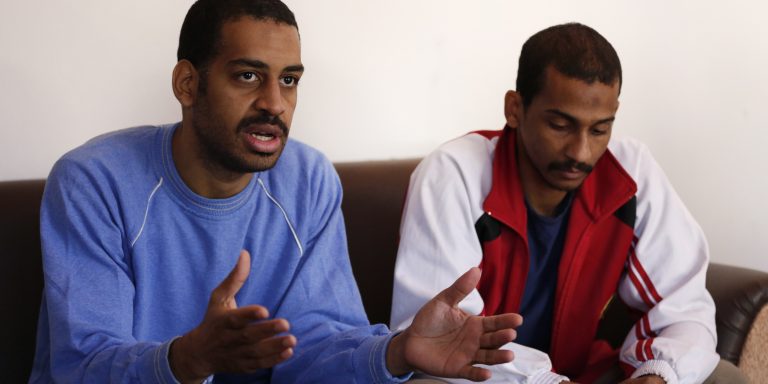INTELBRIEF
August 31, 2020
IntelBrief: Bringing Islamic State Terrorists to Justice

Bottom Line Up Front
- On August 18, 2020, the United States decided it would not pursue a death penalty case against two Islamic State terrorists, Alexanda Kotey and El Shafee Elsheikh, commonly referred to by their nickname ‘The Beatles.’
- In late August, the UK Supreme Court enabled greater cooperation between the UK government and the United States by lifting its stay, previously prohibiting evidence sharing related to Kotey and Elsheikh.
- Kotey and Elsheikh engaged in heinous acts on behalf of the Islamic State, leading to their designation as terrorists by the U.S. Department of State in 2017.
- While the U.S. government has not yet publicly announced the specific charges that Kotey and Elsheikh would face, both are likely to be charged with a wide range of federal criminal violations.
On August 18, 2020, Attorney General William Barr sent a letter of assurance to Priti Patel, the United Kingdom’s Home Secretary, explaining that the United States will forego the death penalty against infamous Islamic State terrorists Alexanda Kotey and El Shafee Elsheikh, British citizens known as ‘the Beatles.’ In return, the U.S. government requested that the UK share evidence that could be used in federal court proceedings. Kotey and Elsheikh were captured in Syria by Syrian Democratic Forces in January 2018 while trying to flee the collapse of the IS caliphate. In October 2019, as the United States began downsizing its operation in Syria, Elsheikh and Kotey were taken into custody. Today, the United States holds Kotey and Elsheikh in Iraq and Barr’s letter intimated that unless the UK cooperated by providing additional information by October 15, 2020, the United States would consider abandoning its pursuit of a legal case. In such a scenario, the Government of Iraq would likely take custody of the duo. This possibility is alarming to human rights advocates, since the Iraqi system of jurisprudence is lacking safeguards that allow for a deliberative and fair trial process. The Iraqi justice system has frequently meted out capital punishment for alleged ISIS members in short order.
In 2015, the United States requested cooperation in the Kotey and Elsheik case with the UK government through a mutual legal assistance treaty, which allows the two countries to exchange information for the purposes of levying criminal charges against individuals. In the case of Kotey and Elsheikh, after the UK stripped them of their British citizenship in 2018, the UK began providing the United States information. Shortly thereafter, citing human rights concerns and the fact that her son could face the death penalty in the United States, Elsheikh’s mother initiated a court process to stop the flow of information. In response, the UK Supreme Court sided with Elshiekh’s mother to temporarily prohibiting US-UK cooperation on this case. However, on August 26, 2020, the UK Supreme Court lifted the stay barring the sharing of information with the United States, clearing the way for the United States to criminally charge Kotey and Elsheikh. This evidence purportedly includes voice analysis that may shed more light on the roles Kotey and Elshiekh played in the illegal detention of more than 20 foreign hostages, including Americans.
Kotey and Elsheikh were members of an Islamic State kidnapping and hostage-holding ring that was dubbed the Beatles because of their British accents. Kotey and Elsheikh are two of the four Beatles who have yet to been either formally charged with criminal acts associated with IS or killed while fighting with the group. Muhammed Emwazi, also known as Jihadi John, gained infamy for serving as IS’s hostage executioner. Emwazi was killed in a 2015 drone strike. Aine Davis, who the media has anointed a Beatle, is serving a seven-year prison sentence in Turkey for belonging to a terrorist group. In January 2017, Kotey was sanctioned as a terrorist by the U.S. Department of State for his role as a guard over the prisoners and ‘likely engaged in the group’s executions and exceptionally cruel methods.’ In May 2017, the State Department labeled Elsheikh a Specially Designated Global Terrorist pursuant to E.O. 13224 for being part of the IS execution cell where he ‘earned a reputation for waterboarding, mock executions, and crucifixions while serving as an ISIS jailer.’
While the United States has yet to formally announce its charges against Kotey and Elshiekh, Barr’s letter to Patel notes that the two have ‘allegedly been involved in kidnappings, murders, and other violent crimes.’ In addition to the relevant federal charges applicable to the activities alleged in the Barr letter, it is also likely that both Kotey and Elsheikh will be charged for providing material support to a designated Foreign Terrorist Organization, which alone could put them behind bars for more than two decades. Finally, in late July 2020 both Kotey and Elsheikh admitted in an NBC news video that they interacted with Kayla Mueller, the American NGO worker held by IS between August 2013-February 2015. Elsheikh admitted in the video that he took her email address from her. In the video, Elsheikh also admits hitting James Foley, an American journalist who was murdered by IS on August 19, 2014. These incriminating videos and the UK decision to share additional information with the United States bodes well for a successful criminal prosecution of Kotey and Elsheikh.